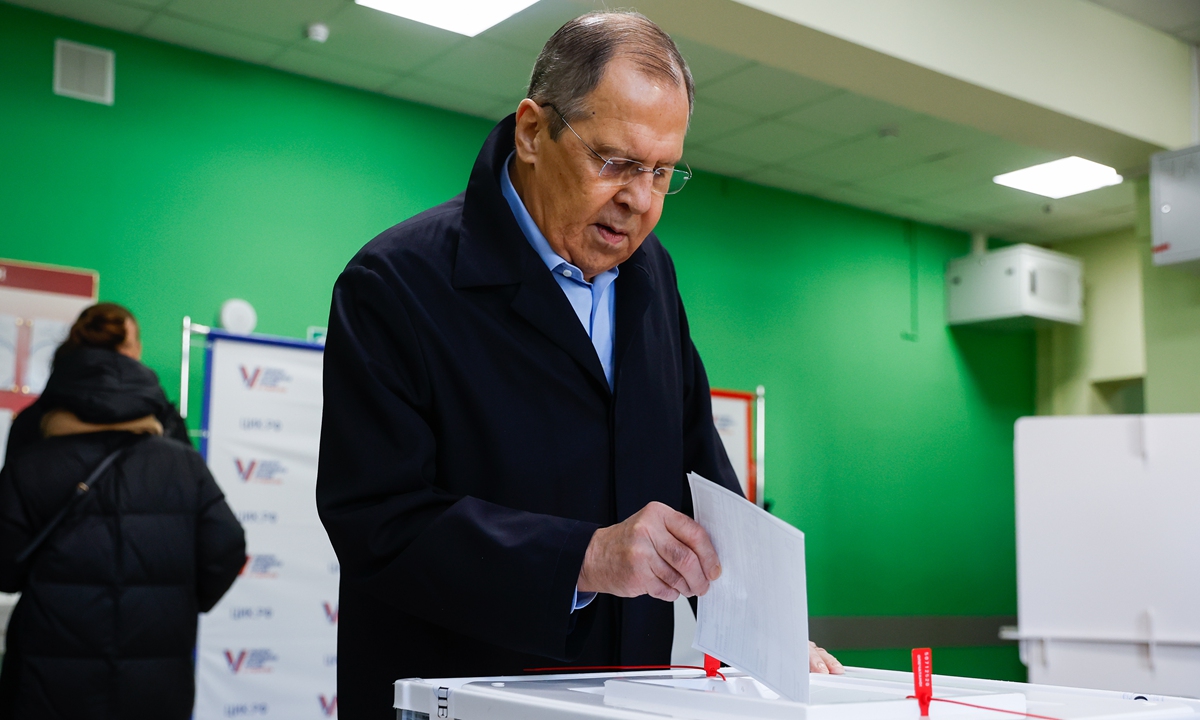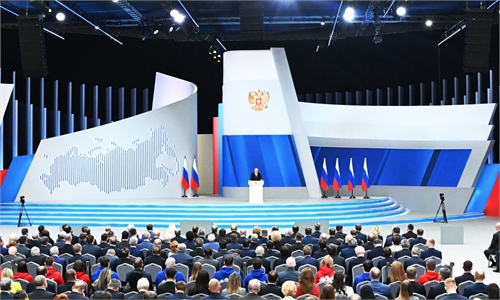Russia holds presidential election amid rising tension with the West
Moscow’s current position on geopolitics, regional security likely to remain unchanged, “looking eastward” to continue

Russian Foreign Minister Sergei Lavrov casts his ballot during the 2024 Russian presidential election in the Moscow region on March 15, 2024. Photo: VCG
Four candidates will compete for the top state post, including Vladimir Putin, the incumbent president and an independent candidate, Vladislav Davankov of the New People Party, Leonid Slutsky of the Liberal Democratic Party and Nikolai Kharitonov of the Russian Communist Party.
According to the independent Levada Center, Putin's approval rating stood at 86 percent in a February poll, and his overall approval ratings have all been above 80 percent since December 2022.
On election days, more than 94,000 polling stations will be open in Russia from 8:00 am to 8:00 pm local time. A total of 295 polling stations will open in 144 foreign countries and on the territory of the Baikonur space center, which Russia leases from Kazakhstan, news agency Tass reported.
According to Russian media, the 2024 election is the first ever Russian presidential election to continue for three days. The presidential election is also the first time that voters will have the option of casting their ballots electronically, with online voting available in 29 regions, including Moscow, comprising one-third of the country's constituent regions.
Aggravated tensions
It is also the first Russian presidential election that will see the participation of residents in Eastern Ukraine regions including Donetsk, Lugansk, Zaporizhzhia and Kherson, according to media reports. The Ukrainian Foreign Ministry on Thursday described the vote in these regions as "illegal and void," Reuters reported. On the same day, Ukraine launched a drone attack in the Russian border region of Belgorod, causing two deaths and wounding 12 people, the Associated Press (AP) reported.
US and Western media have also been extremely unfriendly to Putin in their coverage of the election. CNN said Putin's opponents were "carefully curated by the Kremlin" and results of the elections are a "foregone conclusion." Meanwhile, a US think tank scholar called Russia's election "a sham" in his recent interview with Associated Press.
Ahead of the election, several Russian authorities accused hackers from "Western countries" of plotting and already orchestrating cyberattacks on Russian election infrastructure, media reported.
By denying the legitimacy of the Russian election, the US and the West are attempting to cut off their channels of dialogue with Russia, Cui Heng, a scholar from the Shanghai-based China National Institute for SCO International Exchange and Judicial Cooperation, told the Global Times.
Even if the US and West deny the legitimacy of Russian election, they still need to contact with Russia on certain important issues, such as nuclear arms control talks, which makes their tough words pointless, said Cui.
According to Zhang Hong, a senior research fellow at the Institute of Russian, Eastern European and Central Asian Studies of the Chinese Academy of Social Sciences, the confrontation between Russia and the West will continue after the election as Putin, if elected, is likely to stick to his current position on geopolitics and regional security.
There are still serious contradictions between Russia and the West over the Ukraine crisis, said Zhang, noting that Putin's staying in power would mean that Russia will continue its tough stance on the Ukraine crisis and leave less room for adjustment.
Ahead of the Russian election, French President Emmanuel Macron on Thursday warned Western powers against showing any signs of weakness to Russia, and reiterated that sending Western troops into Ukraine shouldn't be ruled out, according to AP.
NATO Secretary-General Jens Stoltenberg on Thursday urged allies to step up military support for Ukraine, saying "it would be a great historic mistake to allow Putin to prevail," media reported.
The external environment and Russia's security situation during the election period are more tense than before, with Russia facing the risk of escalating military confrontation with NATO, said Zhang, "there is a growing pessimism about relations with the West in Russia," and that will make Moscow "keep looking eastward," especially economically, Zhang added.
Continuity and certainty
Even if there is a ceasefire in the Ukraine crisis, it is almost impossible for the West to withdraw sanctions against Russia in a short period of time, so Russia needs to find more markets to ensure stable economic development, the expert said.
Echoing Zhang, Wang Xiaoquan, an expert from the Institute of Russian, East European and Central Asian Studies at the Chinese Academy of Social Sciences, said that Russia will further strengthen relations with developing countries and emerging economies such as China, India and the Islamic world, and seek a greater role for Russia in the construction of the new international order.
It may further work with the Global South in his possible next term and enhance the status and role of the UN, the Shanghai Cooperation Organization, "BRICS +" and other multilateral mechanisms of developing countries, promoting the process of multi-polarization, Wang said.
According to the expert, Putin has been working hard to weaken the monopoly of the "Anglo-Saxon countries" in the world economy, strengthen the industrial and supply chain connection with the emerging economies, strengthen cooperation with the world's major producers of resources, and expand local currency settlement of international oil and gas trade and other commodities.
Putin is expected to further promote Russia's economic "turn to the East," which will have a profound impact on the world's energy, financial and geo-economic patterns, Wang said.
In terms of China-Russia relations, the momentum of steady development will continue, analysts said.
China-Russia relations are a model of relations between major powers. After the end of the Cold War, China and Russia have maintained a steady development of relations with mutual trust and cooperation in economic, political, security, social and regional affairs, said Zhang.
No matter how relations between Russia and the West develop, and no matter how China-US ties develop, the basic principle of "non-alliance, non-confrontation and non-targeting of any third party" will continue.


